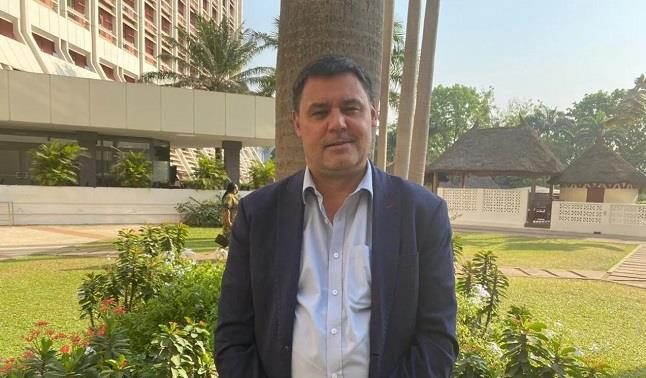Speaking at the Trees from Art Climate Change forum on Friday, July 1, 2022, Sean Melbourne, Head of Climate Change & Energy, West Africa, underlined the need to adopt the use of technologies to address the impact of climate change

Only last month, when visiting an art exhibition in Lagos, I was reminded of the critical role that the arts can play in engaging young people and adults with new perspectives on climate change. This role, and the transformative impact of the arts, is beginning to be more and more appreciated. Many pieces of art were made from recycled materials. The visual and emotional effect was impactful and stunning.
We cannot address climate change without technology. Climate technologies that help us reduce greenhouse gas emissions include renewable energies such as wind, solar and hydropower.
And to adapt to the effects of climate change, we use climate technologies such as drought-resistant crops, early warning systems and sea walls. There are also so called “soft” climate technologies, such as energy efficient practices or training for using equipment.
The urgent need for climate technology development and transfer was explicitly recognised in the ground-breaking Paris Agreement, and an entire day was devoted to science and innovation at COP26 in Glasgow.
It’s important though that the benefits of science and innovation reach and enable the most vulnerable in society. One of the most encouraging announcements at COP26 focused on accelerating the testing, adoption and scalability of digital innovations that will enable the world’s most vulnerable populations to adapt, anticipate and absorb the negative effects of climate change.
GSMA’s Mobile for Development for example, with the support of its donors and partners, has helped advance the use of mobile technologies and digital solutions to deliver socio-economic and climate impact. Their work strives to create a more resilient future where communities not only survive climate shocks but thrive in spite of them.
Digital technologies are being used right now to strengthen participatory forest management efforts in Africa, to support climate-resilient agriculture, and to unlock access to climate finance. For instance, 4R Digital’s Carbon Value Exchange platform helps to monetise carbon reduction and sequestration activities from a range of micro-small projects. There are many other examples, including Pay-as-you-go solar for mobile operators.
Promising though many new technologies are, it would be unwise to put all our eggs in one basket. Arguably, the hope of technological advances has led to procrastination on climate change from some of our politicians and companies. A procrastination we can ill-afford. Cultural, social and political transformation is also essential to enable widespread deployment of both behavioural and technological responses to climate change. Events like this one today can boost such a transformation.
Under the UK’s COP Presidency, 95% of the largest developed country climate finance providers made new, forward-looking climate finance commitments, with many doubling or even quadrupling their support for developing countries to take climate action.
At COP26, there was significant progress on adaptation finance, with agreement that developed countries should at least double their finance for adaptation by 2025. Additionally, donors committed $356 million to The Adaptation Fund, the highest single mobilisation of the Fund.
These macro figures, whilst encouraging, will not impress everybody and I can well understand that it’s improved access to sustainable finance that really matters to civil society, SME’s and entrepreneurs – “show me the colour of your money you might say”.
Well, that finance is there but you need to actively look for it. I would like to draw your attention to the NDC Partnership’s second annual youth engagement forum which will reflect on climate finance and aims to share success stories around inclusive finance. The event will run virtually on July 21, 26 and 28.
Secondly, I want to remind you that applications are currently being accepted by the Darwin Initiative to support biodiversity in Africa. Grants for up to £500,000 are available for up to five years. Applications close July 25. I would be happy to share the links to these funding opportunities if you contact me via email or social media after this event. There are many more examples of sustainable finance.
Another potential platform I would encourage you to explore is Africa Climate Week, which is taking place in Gabon and virtually from August 29 to September 1. The organisers are now accepting applications from organisations that are interested in hosting side events or sharing their initiatives in the Climate Action Hub.
To conclude, I’m delighted that organisations such as Solution17 Global and those present today are providing a platform for the arts and climate change, raising awareness of this critical issue, educating and inspiring climate action.
